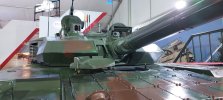To answer your first question, simply because it’s older. Over a decade older to be exact. I never said ZTZ-99A is worst than VT4, only that it’s not more technologically advanced. ZTZ-99A owing to its thicker armor and better design is definitely better protected than the VT4 and retains similar mobility despite this weight increase due to a more powerful engine output. It also has most of everything the VT4A1 does, just a bit older. Keep in mind both tanks fire the same ammo, and use the same ERA, but the base armor is thicker on the 99A.
VT4P (VT4A1) represents the best of Chinese tank technology at the moment when it comes to optics, stabilizers, FCS/GCS and electronic systems simply because it’s an entire decade newer. It’s still Chinese technology at the end of the day and they could easily put it on a new ZTZ-99.
I assume we will see an updated ZTZ-99A (ZTZ-99B) eventually with the hard kill APS systems China is offering for VT4 (GL5 and GL6, which are better than the APS system on the ZTZ-99A) and other technologies from the VT4A1 and perhaps even newer.
China does not have a need for the best tanks, they don’t have any adversaries with good tanks, the only two they have are india and Taiwan. Taiwan uses M60s and India uses stock T90S both of which look obsolete compared to a ZTZ-99A or a VT4A1, that’s why China doesn’t spent more money on upgrading its tanks, instead spending them on its navy or Air Force where it needs to contend with USA and needs cutting edge tech.
When China did need new tanks, particularly light tanks as seen in Ladakh, they developed the ZTQ-15, which is a very good light tank, I’d say it is also technologically ahead of the ZTZ-99A, again, simply because it’s newer, not because it’s better, surely the 99A has much better firepower and armor, it’s just nearly 12 years older.
And by design language I mean the fact that the VT4 is based on the VT1/Al-Khalid design, it retains the same basic design with upgrades, it’s the same shape, very similar layout and controls etc. The 99 is based on an entirely different design, I’m willing to bet there is significant commonality in the smaller parts of VT4 and AK, which is saving HIT quite some bother right now. Wouldn’t be the case with ZTZ-99.
ZTZ-99 is heavier because it’s bigger, has more armor, it’s more expensive because it’s not meant for export, which means China has to set up a new production line for it to cater for export customers, it can’t use the VT4 production line to produce those, it’s also more expensive because if China wants to order 99As for itself, then it has an issue with parts delivery. These are the seemingly little logistical things nobody thinks about, but are actually what dictate the cost of something. Let me put it like this, if I asked China to build me a JF-17 from scratch, it might cost them more than building a J-10C, despite the massive capability and size difference between the two, simply because China has an active J-10C production line, but not a JF-17 one. Moreover, we are producing VT4 locally, on the same machines and factories as AK, would not be possible with ZTZ-99, new parts, new manuals, new designs, all of this adds to the cost, and that’s only if we get ToT for that, we had to negotiate a lot to get full ToT for VT4 already.
China only spends enough money on something as it needs, if something is beyond the capability it requires, it will not spend money on it, if anything PLA downgraded Z-10s before inducting them simply because they didn’t need the added capabilities, nobody around them had better Gunships in such numbers, the money can be better used elsewhere. The Chinese and the PLA are extremely smart with their spending, as they should be, when running an armed forces that massive.
The export customers (Pakistan in this case) needed more capabilities than PLA did, because for us the Z-10 was going to be the top of the line thing, so they added them for us, and once PLA itself trialed the Z-10M and ME. They actually added some of its upgrades that they liked to their own Z-10Ks as well.












